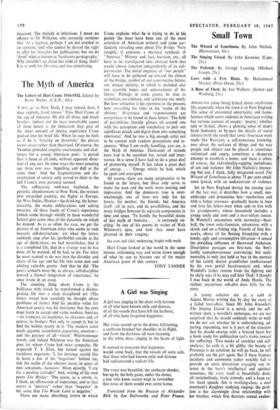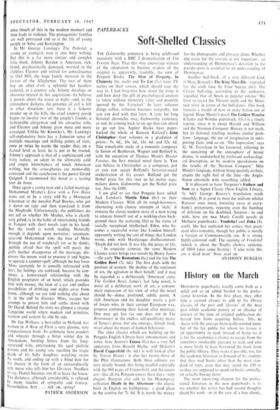Small Town
The Wizard of Loneliness. By John Nichols. (Heinemann, 30s.) The Singing Lizard. By John Knowler. (Cape, 21s.) The Pedestal. By George Lanning. (Michael Joseph, 25s.) Love with a Few Hairs. By Mohammed Mrabet. (Peter Owen, 30s.) A Rose of Flesh. By Jan Wolkers. (Seeker and Warburg, 21s.) _ AMERICANS enjoy being lyrical about small-town life, especially when the town is in New England. The sense of existential uncertainty and home- lessness which seems endemic in American writing has various avenues of escape: 'poetry,' whether epic or lyrical, allows a glowing sense of man's basic humanity to by-pass the details of social texture (with the result that some American work reads like Russian); a self-conscious knowing- ness about the surfaces of things and the way people and objects can be placed is sometimes victimised and angry, sometimes a desperate attempt to establish a home; and there is often, of course, the individuality-sapping melodrama of sex and violence. Mr John Nichols's interest- ing but not, I think, fully integrated novel The Wizard of Loneliness is about 75 per cent small- town lyrical, with an undercurrent of violence.
Set in New England during the closing year of the last war, it describes how a small, mis- anthropic and precocious boy—motherless and with a father overseas—gradually learns to trust and love his fellow-men when sent to live with his grandparents, whose household includes a young uncle and aunt and a near-infant cousin. In Wendall's encounters with normality—base- ball, the town soda-fountain, adventures with a skunk and on a fishing trip, Fourth of July fire- works, above all his fleeting friendship with a lonely, ugly and consumptive librarian—I sensed the presiding - influence of Sherwood Anderson. Descriptive passages are first-rate; the boy's lordly cantankerousness convincing; but senti- mentality is only just held at bay in the portrait of the saintly doctor grandfather (embarrassed by his own genial facetiousness) and, when Wendall's father returns from the fighting and he shyly asks if he may call him 'Dad,' I thought I was back in the world of Andy Hardy. The violent, mysterious sub-plot does little for the story.
A yobng solicitor sits at a café in Aigues Mortes writing day by day the story of a failed love-affair. Since Mr John Knowler's The Singing Lizard is a novel, and the self- written story a novelist's technique, we are not surprised that he should suddenly write so well; we do not ask whether he is embroidering, ad- justing, expanding, nor is it part of the situation that he should emerge with a bruised heart but a book ready for publication (art's ironic reward for suffering). 'Two weeks of sunshine and self- analysis,' he calls it, a bit glibly; the beauty of Provence is no solution; he will go back, he will probably see the girl again. But if these framing incidents and comments rather notably fail to provide an extra dimension engaging our in- terest in the hero's intellectual and spiritual resources, the story itself is beautifully done, all verisimilitude, lively comedy, and a keen ear for local speech. Jen is working-class, a coal merchant's daughter studying singing; the prob- lem is her alarmingly close relationship with her brother, which first destroys sexual exuber-
ance (much of this in the modern manner) and then leads to violence. The protagonists' families are well portrayed and so is the life of young people in Soho and Kensington.
In Mr George Lanning's the Pedestal, a young or youngish man is also busy writing. But this is a far more sinister and complex little book. Johnny Bayden is American, rich, blond, psychiatrically damaged, married to the childless Eleanor and retired for convalescence to Owl Hill, the huge family mansion in the forests of the Alleghenies. The two of them buy an objet d'art, a splendid but headless pedestal, at a country sale. Johnny develops an obsessive interest in this acquisition—he believes it prowls about the house at night—and, as the atmosphere darkens, the presence of evil is felt in other directions too; there is a hideous murder up in the hills, the cruel country gossip begins to involve two of the couple's friends, a fashionable clergyman and his attractive wife, and Eleanor and Johnny grow more and more estranged. Unlike Mr Knowler's, Mr. Lanning's self-explanatory hero has a Jamesian sense of multiple meanings and shifting points of view; once or twice he warns the reader that, on a factual level at least, he is not to be trusted. Johnny's approach is that of a sophisticated and witty isolate, an adept in the ultimately cold
and empty knowingness of much American writing, but the atmospherics are memorably conveyed and the conclusion is the purest Grand Guignol. I recommend this novel as a teasing tour de force.
Once again a young man and a failed marriage. Mohammed Mrabet's Love with a Few Hairs turns out to be a story told by a Moroccan fisherman to the novelist Paul Bowles, who got it down on tape and then translated it from the Moghrebi. Unfortunately, the publishers do not tell us whether Mr Mrabet, who is clearly very gifted, is in the habit of entertaining friends in Tangier with short novels kept in his head. But the result is worth reading. Naturally enough it depends upon narrative: seventeen- year-old Mohammed wins the love of Mina through the use of witchcraft (or so he thinks, guiltily afraid that the spell will pass); the girl's mother disapproves of the marriage, dis- covers the means used to procure it and begins to operate a counter-spell; although the boy loves Mina (certainly he is sexually infatuated with her), his feelings are confused, because he con- tinues a homosexual relationship with the English proprietor of an hotel, which provides him with money, the loan of a car and endless possibilities of drinking and nights away from home, although we are told nothing else about it; in the end he divorces Mina, escapes her attempt to poison him and settles down with Mr David. Behind the story we glimpse a strange Tangerine world where modern and primitive, western and eastern lie side by side.
Mr Jan Wolkers, a best-seller in Holland, has written in A Rose of Flesh a very gloomy, very compassionate book. Its asthmatic hero ponders and wheezes through a bitter winter day in Amsterdam, burning letters from his long- separated wife, entertaining his aged pietistic parents and his young son, recalling the tragic death of his baby daughter, watching swans fly south, and ending up with a blind date for the theatre in the form of an extraordinarily ugly nurse who tells him her life-story. Needless to say, Daniel becomes too ill to leave the house. The darkness, although considerable, is relieved by many touches of sympathy and fantasy. Nevertheless, brrr . . . roll on, spring!
PATRICK ANDERSON



































 Previous page
Previous page